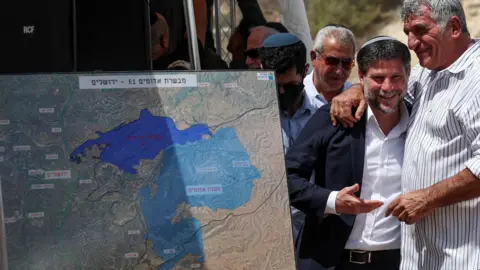Israeli Finance Minister Bezalel Smotrich has made headlines with his latest announcement regarding the expansion of Israeli settlements in the occupied West Bank. The plans to construct over 3,000 housing units are aimed at advancing the controversial E1 project, which lies strategically between Jerusalem and the Maale Adumim settlement. According to Smotrich, this initiative serves a dual purpose – to bolster Israeli territorial claims in the region and to significantly thwart any aspirations for a Palestinian state.
The E1 project has been a source of contention for decades, facing robust international opposition. Building on this land would effectively sever the West Bank from East Jerusalem, limiting any future continuity for a potential Palestinian state. During his announcement, Smotrich boldly declared, “The plan will bury the idea of a Palestinian state,” underscoring the gravity of the situation in terms of peace negotiations and regional stability.
Settlements in the West Bank are viewed as illegal under international law, a stance that Israel vehemently contests. Approximately 700,000 Israeli settlers currently reside in about 160 settlements across the West Bank and East Jerusalem, territories that Palestinians envision as part of their future sovereign state. The settlements fuel tensions and are a critical challenge in Israeli-Palestinian relations.
While Smotrich speaks of the new housing projects as a fulfillment of political and ideological ambitions, he also attempts to frame them within a historical and religious narrative. He stated that the land was divinely promised to the Jewish people and reiterated, “This is Zionism at its best – building, settling, and strengthening our sovereignty in the Land of Israel.” This rhetoric reflects a broader ideological stance among the far-right elements within Israeli politics, which particularly emphasizes the expansion of Jewish settlements in contested areas.
In context, the announcement comes at a time when numerous nations are signaling their intention to recognize Palestine as a state, which Israel has actively denounced. While addressing reporters alongside officials from the Yesha Council and Maale Adumim, Smotrich insisted that “there will be no state to recognize,” emphasizing Israel’s determination to exert control over the contested territories.
The Israeli advocacy group Peace Now responded to these developments by accusing the Netanyahu government of taking advantage of international political dynamics to cement the annexation of the West Bank. They warned that these actions contribute not only to diplomatic tensions but also to ongoing cycles of violence. Peace Now articulated that, “It is clear to everyone today that the only solution to the conflict… is through the establishment of a Palestinian state alongside Israel.” They held the view that continued settlement expansion exacerbates hostilities and perpetuates suffering.
Furthermore, the Palestinian foreign ministry has labeled the new settlement plans as “an extension of crimes of genocide, displacement, and annexation.” This characterization underlines the ongoing humanitarian concerns stemming from Israeli settlement policies and military actions. Human rights activists argue that these policies can lead to the oppression and marginalization of Palestinian communities.
The construction initiative, which had previously been stalled for 20 years, is seen as a strategic maneuver to isolate Palestinian regions, particularly those bordering East Jerusalem. Analysts view this as a tactical play following the intensified hostilities resulting from Hamas’s violent attacks that began in October 2023, during which Israel has asserted both a security rationale and a claimed necessity for military action against Palestinian militants.
Ultimately, this latest settlement announcement by Bezalel Smotrich highlights the deep divisions and thorny complexities of the Israeli-Palestinian conflict, raising questions about the future of peace negotiations, statehood, and the broader geopolitical landscape in the Middle East. As the situation continues to unfold, the potential for further escalation remains high, prompting urgent discussions among international communities about the paths to lasting peace and stability in the region.












